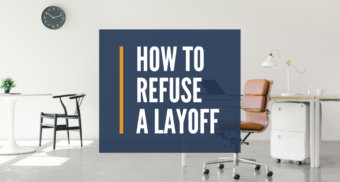Ministry of Labour quietly updates its policy on the Infectious Disease Emergency Leave

With little fanfare, the Ministry of Labour (MOL) has updated its policy on the Infectious Disease Emergency Leave (IDEL). The MOL’s recently announced the changes to the Employment Standards Act (ESA) brought on by IDEL, with important new information about the end of the COVID-19-related rules.
Three main points regarding the changes:
- The COVID-19 period will come to an end on September 25, 2021. It is the third such extension since IDEL came into effect in May of 2020
- Starting on September 26, 2021, employees will be able to file a complaint with the MOL claiming that they have been laid off and that this is a constructive dismissal under the ESA
- If the employee does not claim constructive dismissal, the employer can continue to keep the employee on layoff under the ESA
The COVID-19 period will come to an end on September 25, 2021 and could be extended
The COVID-19 period was originally set to end in September 2020. It has been extended twice since, most recently until July 3, 2021. With this further extension, the COVID-19 period will extend beyond 18 months in total (March 1, 2020 to September 25, 2021). The COVID-19 period may be extended again in September.
Starting on September 26, 2021, employees can file a complaint with the MOL claiming that they have been laid off and that this is a constructive dismissal under the ESA.
The COVID-19 IDEL rules state that employees who have been laid off or have had their hours or pay reduced due to COVID-19 cannot claim to have been constructively dismissed during the COVID-19 period. Instead, they are deemed to be on IDEL. This will continue until September 26, 2021, when employees will again be entitled to claim that the changes amount to a constructive dismissal under the ESA. As was recently held by the courts, these employees have always been able to assert a claim for constructive dismissal in such cases under the common law.
The end of the COVID-19 period will mean that employers will no longer be able rely on the changes to the ESA to place employees on a deemed leave (IDEL). That said, employees who need to take the leave, for instance if they have to self-isolate due to a positive COVID-19 test result or because they need to care for their children who are still not back in school, they will continue to be able take the leave, because it is their choice and not the employer’s.
Remember that IDEL is a job-protected leave, meaning the employer must provide the employee with the same job at the end of the leave if it still exists or a similar job if the former job no longer exists. Employers also cannot retaliate against an employee for having taken the leave.
After September 25, 2021, an employee can be placed on a traditional layoff as provided for by the ESA.
In the MOL’s view, the clock regarding layoffs resets on September 26, 2021. Employers who can no longer keep their employees on IDEL will still have the option of placing the employees on a traditional layoff. Under the ESA, the maximum length of the layoff before it is considered a termination will be either:
- 13 weeks in a 20-week period if the employer does not continue the employee’s benefits, or
- 35 weeks in a 52-week period if the employer does continue the employee’s benefits
Therefore, some employees may not be able to claim that their layoff has become a termination before May 2022.
When an employer lays off an employee, the employee can choose to accept the layoff, or the employee can treat the layoff as a constructive dismissal and require the employer to provide the employee with a severance package. The rules of the amount of severance owed to an employee differ between the ESA and the common law. Often, the common law will offer much more by way of severance than the ESA. The MOL can only require the employer to pay what is owed under the ESA. To obtain what is owed under common law, it is important to speak with an experienced employment lawyer. Employees cannot both make a complaint to the MOL for their ESA entitlements and pursue their common law entitlements with a lawyer, they must choose one or the other.
Certain employees will not be able to assert that their layoff is a constructive dismissal. These include employees who have signed an employment contract allowing their employer to lay them off, and employees who had already been laid off prior to COVID-19 and for whom layoffs were a foreseeable risk in their jobs.




